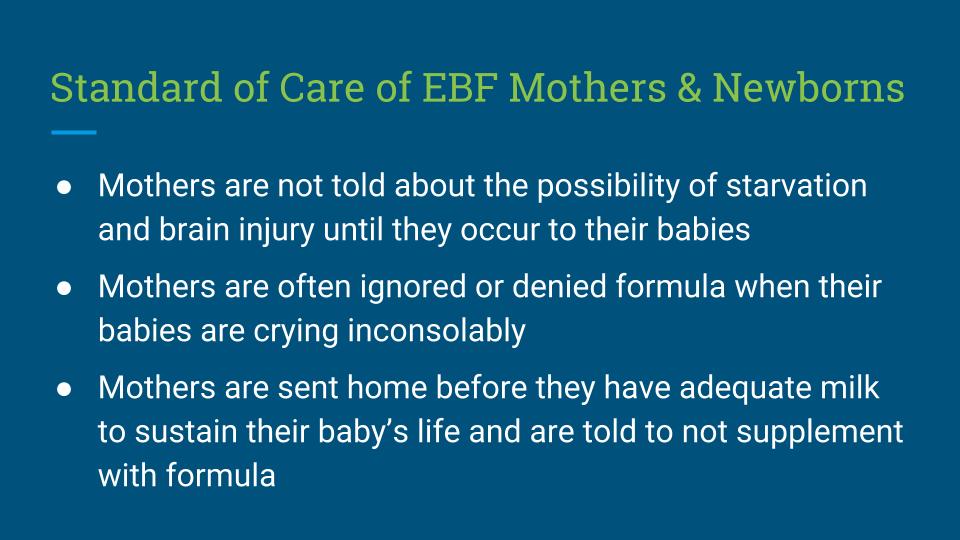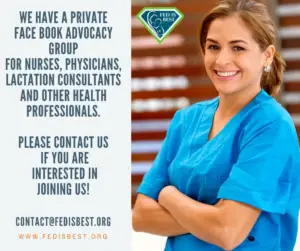We’ve had two sad experiences with the ‘Baby-Friendly’ aspiring hospital, Massachusetts General Hospital. Both issues involved two things: the fact that I had breast reduction surgery and unknown/limited milk supply and the fact that my wife induced lactation.
With our first baby, my wife breastfed her immediately after birth while I recovered for a minute (fast, unmedicated, and awesome labor). She then refused to latch on to my breasts and the hospital encouraged (kind of forced) my wife to put the baby to her breast. She was in med school and had wanted to pump and never wanted to be the primary nurser. She started to cry because we were offered no information or choice in the matter. I was encouraged to continue putting a crying, non-latching baby to my breast over and over. It was horrid. We left the hospital with the advice to “Keep switching her back and forth,” which resulted in her becoming malnourished.
This experience greatly impacted our experience of early parenthood. We felt that we had no choices and that the hospital was myopically focused on breastfeeding and not on baby feeding. They kept saying, “You never know! You might have a full breast milk supply!” But after surgery, my chances of full milk supply were very, very slim. I was pumping and getting a dime size (flat) drop of colostrum.
They kept saying that it’s normal to have very little colostrum. The hospital absolutely refused to face reality. This makes me really sad to write about. But it’s important.

During our second baby’s birth (same moms, same roles) we brought my wife’s pumped milk and she actually left the hospital to take care of the older kiddo. The nurse really really didn’t want me to give the new baby our pumped milk. I ended up sneaking it to her from a little cup. I had to sneak around to feed my baby.
Once again the hospital nurses (all lactation consultants) kept having me nurse and kept telling me it was okay if the baby didn’t get any milk in the first 24 hours.The thing is, I didn’t want to deprive her of milk. I wanted to start her off strong, with milk from both moms and I did. To deny a newborn baby food and fluids is cruel and is child abuse.

I thank the Fed Is Best Foundation from the bottom of my heart for being a beacon for women like me. For the record, both girls got mostly breast milk and some formula. My first baby never really nursed with me. Baby 2 nursed to 10 months. They are both brilliant and funny and fiery and healthy and sassy and all the best things.
Know Your Risks for Delayed Onset of Full Breast Milk Supply
WRITING YOUR HOSPITAL ABOUT YOUR BABY’S FEEDING COMPLICATIONS
Every year, thousands of infants in every country are hospitalized for complications due to underfeeding from exclusive breastfeeding including dehydration, hypoglycemia and excessive jaundice. Many families leave these experiences traumatized and some babies are irreversibly injured. The only way hospitals will know to make their infant feeding policies safer is through patients raising awareness. If your child experienced a feeding complication, please consider writing your hospital’s CEO and your health insurance company. Here is a letter template to help you get the process started. The more detail you are able to provide the better. For more information on how to gather information about your child’s hospital course and the possibility of injury, please write christie@fedisbest.org.
Writing Your Hospital and the Joint Commission About Your Baby’s Feeding Complications
https://fedisbest.org/2018/04/i-had-all-of-the-support-in-the-world-and-breastfeeding-still-didnt-work/
CONTACT US/VOLUNTEER
THANK YOU FOR YOUR INTEREST IN THE FED IS BEST FOUNDATION!
Our mission statement is:
The Fed Is Best Foundation works to identify critical gaps in the current breastfeeding protocols, guidelines, and education programs and provides families and health professionals with the most up-to-date scientific research, education, and resources to practice safe infant feeding, with breast milk, formula or a combination of both.
Above all, we strive to eliminate infant feeding shaming and eliminate preventable hospitalizations for insufficient feeding complications while prioritizing perinatal mental health.
HOW YOU CAN SUPPORT FED IS BEST
There are many ways you can support the mission of the Fed is Best Foundation. Please consider contributing in the following ways:
- Join us in any of the Fed is Best volunteer and advocacy, groups. Click here to join our health care professionals group. We have: FIBF Advocacy Group, Research Group, Volunteer Group, Editing Group, Social Media Group, Legal Group, Marketing Group, Perinatal Mental Health Advocacy Group, Private Infant Feeding Support Group, Global Advocacy Group, and Fundraising Group. Please send an email to Jody@fedisbest.org if you are interested in joining any of our volunteer groups.
- If you need infant feeding support, we have a private support group– Join us here.
- If you or your baby were harmed from complications of insufficient breastfeeding please send a message to contact@fedisbest.org
- Make a donation to the Fed is Best Foundation. We are using funds from donations to cover the cost of our website, our social media ads, our printing and mailing costs to reach health providers and hospitals. We do not accept donations from breast- or formula-feeding companies and 100% of your donations go toward these operational costs. All the work of the Foundation is achieved via the pro bono and volunteer work of its supporters.
- Sign our petition! Help us reach our policymakers, and drive change at a global level. Help us stand up for the lives of millions of infants who deserve a fighting chance. Sign the Fed is Best Petition at Change.org today, and share it with others.
- Share the stories and the message of the Fed is Best Foundation through word-of-mouth, by posting on your social media page and by sending our FREE infant feeding educational resources to expectant moms that you know. Share the Fed is Best campaign letter with everyone you know.
- Write a letter to your health providers and hospitals about the Fed is Best Foundation. Write to them about feeding complications your child may have experienced.
- Print out our letter to obstetric providers and mail them to your local obstetricians, midwives, family practitioners who provide obstetric care and hospitals.
- Write your local elected officials about what is happening to newborn babies in hospitals and ask for the legal protection of newborn babies from underfeeding and of mother’s rights to honest informed consent on the risks of insufficient feeding of breastfed babies.
- Send us your stories. Share with us your successes, your struggles and everything in between. Every story saves another child from experiencing the same and teaches another mom how to safely feed her baby. Every voice contributes to change.
- Send us messages of support. We work every single day to make infant feeding safe and supportive of every mother and child. Your messages of support keep us all going.
- Shop at Amazon Smile and Amazon donates to Fed Is Best Foundation.
Or simply send us a message to find out how you can help make a difference with new ideas!
For any urgent messages or questions about infant feeding, please do not leave a message on this page as it will not get to us immediately. Instead, please email christie@fedisbest.org.
Thank you and we look forward to hearing from you!


One thought on “How Even Two Moms Couldn’t Make Enough Milk For Their Baby And Were Forced to Sneak Pumped Breast Milk Into The Hospital”